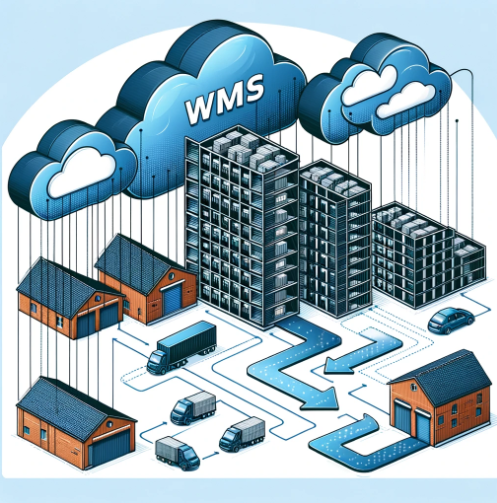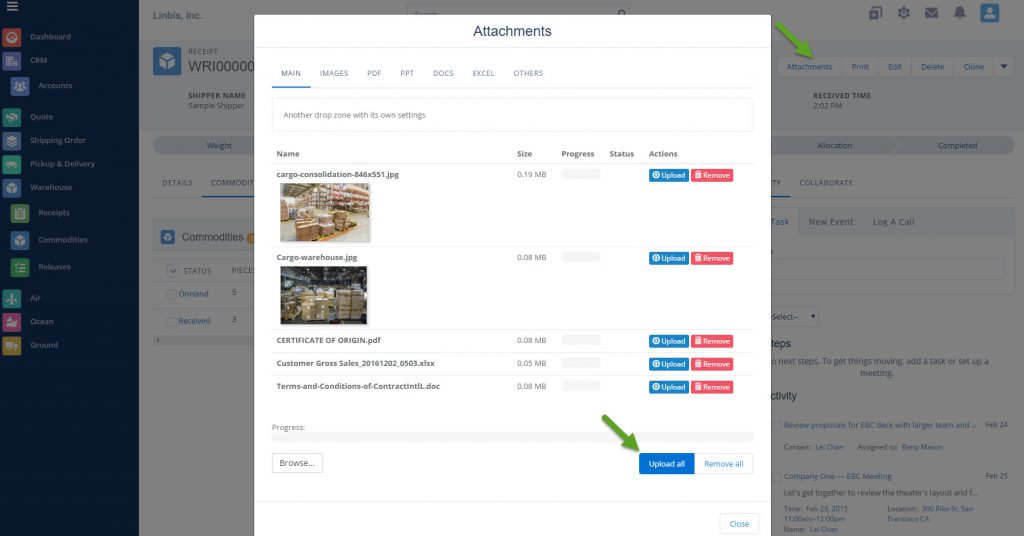Cloud WMS: Benefits and Implementation

Introduction to Cloud-Based WMS
The adoption of cloud-based WMS is rapidly increasing due to its numerous advantages over traditional systems. By utilizing this technology, businesses can enhance their warehouse operations, reduce costs, and improve overall efficiency.
Benefits of Using a WMS on the Cloud
Implementing a cloud-based WMS provides several significant benefits that can enhance warehouse operations and drive business growth. Here are some of the key benefits cloud logistics software:
1. Cost Efficiency
Cloud WMS eliminates the need for expensive on-premises hardware and IT infrastructure. Businesses can reduce capital expenditures and lower maintenance costs by relying on the software provider's infrastructure. Additionally, typically operates on a subscription-based model, allowing for predictable operational expenses.
2. Scalability
One of the major advantages of this WMS is its scalability. Businesses can easily scale their warehouse operations up or down based on demand without the need for significant investments in additional hardware or software. This flexibility ensures that the WMS can grow with the business and adapt to changing needs.
3. Real-Time Visibility
Cloud WMS provides real-time visibility into warehouse operations, enabling businesses to track inventory levels, monitor order fulfillment, and manage warehouse activities from any location with internet access. This real-time data allows for better decision-making and improved responsiveness to customer demands.
4. Faster Implementation
Implementing a cloud-based WMS is typically faster and less complex than deploying a traditional on-premises system. This solutions can be set up quickly, often within weeks, reducing the time to value and minimizing disruption to warehouse operations.
5. Enhanced Security
This software providers invest heavily in security measures to protect their clients' data. Its benefits from advanced security features, such as encryption, multi-factor authentication, and regular security updates. This ensures that warehouse data is secure and protected from unauthorized access.
6. Automatic Updates
With cloud WMS, businesses automatically receive software updates and new features from the provider. This ensures that the system is always up-to-date with the latest technology and improvements without the need for manual upgrades or additional costs.

Implementing a Cloud-Based Warehouse System
Implementing a cloud-based WMS involves several key steps to ensure a successful deployment. Here are some important considerations and steps for implementing:
Assess Business Needs
Before selecting a cloud WMS, it is essential to assess the specific needs of your business. Identify the key features and functionalities required to optimize your warehouse operations. Consider factors such as the size of your warehouse, the complexity of your inventory, and integration requirements with other systems.
Select the Right Vendor
Choosing the right warehouse software vendor is crucial for a successful implementation. Evaluate vendors based on their experience, reputation, customer reviews, and the features offered by their WMS solutions. Ensure that the vendor provides excellent customer support and has a proven track record of successful implementations.
Plan the Implementation
Create a detailed implementation plan that outlines the steps, timeline, and resources required for the deployment of the cloud WMS. Assign responsibilities to team members and establish clear milestones to track progress. A well-defined plan helps ensure a smooth and efficient implementation process.
Data Migration
Data migration is a critical step in implementing a cloud WMS. Ensure that all relevant data, such as inventory records, order history, and customer information, is accurately transferred from existing systems to the new system. Conduct thorough testing to verify data accuracy and integrity
Integration with Existing Systems
Integrate the warehouse management software with other existing systems, such as Enterprise Resource Planning (ERP), Customer Relationship Management (CRM), and Transportation Management Systems (TMS). Seamless integration ensures that data flows smoothly between systems, enhancing overall efficiency and accuracy.
Training and Support
Provide comprehensive training to warehouse staff and other users to ensure they are familiar with the new cloud WMS. Training should cover system functionalities, best practices, and troubleshooting. Additionally, ensure that ongoing support is available to address any issues or questions that may arise.
Comparing Cloud WMS with Traditional WMS
When deciding between a cloud-based WMS and a traditional on-premises WMS, it is essential to understand the differences and advantages of each. Here is a comparison of the two options:
WMS Cost
- Cloud WMS: Lower upfront costs and predictable subscription fees. Reduces the need for significant capital investment in hardware and IT infrastructure.
- Traditional WMS: Higher upfront costs for hardware and software licenses. Ongoing maintenance and upgrade costs can be significant.
Scalability on warehouse management system
- Cloud WMS: Highly scalable, allowing businesses to easily adjust their warehouse operations based on demand.
- Traditional WMS: Limited scalability, requiring additional hardware and software investments to scale operations.
Implementation Time
- Cloud WMS: Faster implementation, often within weeks. Minimal disruption to warehouse operations.
- Traditional WMS: Longer implementation time, often taking months. More complex deployment process.
Security
- Cloud WMS: Advanced security features provided by the saas provider. Regular security updates and patches.
- Traditional WMS: Security depends on in-house IT capabilities. May require additional investment in security measures.
Maintenance and Updates
- Cloud WMS: Automatic updates and maintenance provided by the software vendor. Ensures the system is always up-to-date.
- Traditional WMS: Manual updates and maintenance required. Can be time-consuming and costly.
Accessibility
- Cloud WMS: Accessible from any location with internet access. Supports remote work and real-time visibility.
- Traditional WMS: Limited to on-premises access. May require additional infrastructure for remote access.
Top Solutions for Cloud Warehouese Management Solution
Several top solutions for cloud-based WMS offer a range of features and functionalities to optimize warehouse operations. Here are some of the leading saas software solutions:
1. Linbis
Linbis offers a comprehensive cloud-based WMS that provides real-time visibility, advanced analytics, and seamless integration with other systems. Linbis WMS is scalable and customizable, making it suitable for businesses of all sizes. Functionality like Purchase order management, sales order creation, inventory management improve any business productivity.
2. Oracle Warehouse Management
Oracle Warehouse Management is a robust solution that offers advanced features such as real-time inventory tracking, warehouse automation, and analytics. It is designed to optimize warehouse operations and improve efficiency.
3. SAP Extended Warehouse Management (EWM)
SAP EWM is a solution that provides end-to-end visibility and control over warehouse operations. It offers features such as inventory management, labor management, and warehouse automation, enhancing overall productivity.
4. Manhattan SCALE
Manhattan SCALE provides scalability, flexibility, and real-time visibility into warehouse operations. It offers features such as order management, inventory optimization, and transportation management.
5. Infor CloudSuite WMS
Infor CloudSuite solution designed to optimize warehouse operations and improve efficiency. It offers features such as real-time inventory tracking, labor management, and advanced analytics.
How Linbis Helps Companies with Cloud WMS

Linbis offers comprehensive cloud-based WMS solutions designed to optimize warehouse operations and improve efficiency. Here’s how Linbis can support your WMS needs:
Advanced Warehouse Management System (WMS)
Linbis provides a state-of-the-art logistics software that offers comprehensive tools for inventory tracking, order processing, and labor management. Our WMS integrates seamlessly with existing systems, streamlining workflows and enhancing accuracy.
Real-Time Data and Analytics
Our analytics tools provide real-time insights into warehouse operations, helping managers make informed decisions. Linbis offers advanced analytics and reporting tools that track key performance indicators (KPIs) and provide actionable insights for continuous improvement.
Scalability and Flexibility
Linbis cloud WMS is highly scalable, allowing businesses to easily adjust their warehouse operations based on demand. Our solution is flexible and customizable, ensuring it meets the specific needs of your business.
Seamless Integration
Linbis Logistics Software integrates seamlessly with other business systems, such as ERP, CRM, and TMS. This integration ensures a smooth flow of information across different departments and enhances overall efficiency.
Enhanced Security
Linbis provides advanced security features to protect your data. Our software benefits from encryption, multi-factor authentication, and regular security updates, ensuring that your warehouse data is secure.
Customer Support and Training
Linbis offers comprehensive training and support to ensure that your staff can effectively use our system at your warehouse. Our training programs cover best practices, system functionalities, and troubleshooting, helping your team maximize productivity and efficiency.
FAQ
What is a cloud-based WMS?
A cloud-based Warehouse Management System (WMS) leverages cloud computing technology to manage and optimize warehouse operations. It operates on remote servers accessed via the internet, providing flexibility, scalability, and real-time visibility.
What are the benefits of using a cloud WMS?
The benefits of using include cost efficiency, scalability, real-time visibility, faster implementation, enhanced security, and automatic updates. These advantages help businesses optimize their warehouse operations and improve efficiency.
How do I implement a cloud-based warehouse system?
Implementing a warehouse system involves assessing business needs, selecting the right vendor, planning the implementation, migrating data, integrating with existing systems, and providing training and support to staff.
How does a cloud WMS compare to a traditional WMS?
It’s offers lower upfront costs, greater scalability, faster implementation, enhanced security, automatic updates, and better accessibility compared to a traditional WMS, which requires significant capital investment in hardware, has limited scalability, involves complex deployment, relies on in-house security measures, requires manual updates, and has limited remote access.
What are some top solutions for cloud WMS?
Top solutions for cloud WMS include Linbis, Oracle Warehouse Management , SAP Extended Warehouse Management (EWM), Manhattan SCALE, and Infor CloudSuite WMS. These solutions offer a range of features and functionalities to optimize warehouse operations.

Conclusion
Cloud-based Warehouse Management Systems (WMS) offer numerous benefits, including cost efficiency, scalability, real-time visibility, and enhanced security. By implementing a cloud WMS, businesses can optimize their warehouse operations, reduce costs, and improve overall efficiency.
Linbis provides comprehensive cloud WMS solutions designed to support your logistics needs. For more information on how Linbis can help streamline your warehouse operations and improve efficiency, visit our Warehouse Management Software page and explore our advanced solutions tailored to meet your business requirements.
